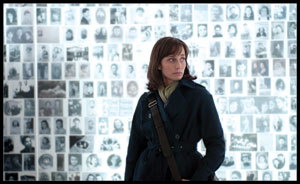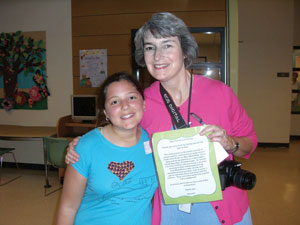Espionage thriller ‘The Debt’ about secret Mossad mission
 “The Debt” is a spine-tingling espionage thriller that holds the audience spellbound with all its twists and turns. It is directed by Academy Award nominee John Madden (“Shakespeare in Love”) and based on the 2007 Israeli film “Ha-Hov.” The movie opened yesterday (Wednesday, Aug. 31) in wide release.
“The Debt” is a spine-tingling espionage thriller that holds the audience spellbound with all its twists and turns. It is directed by Academy Award nominee John Madden (“Shakespeare in Love”) and based on the 2007 Israeli film “Ha-Hov.” The movie opened yesterday (Wednesday, Aug. 31) in wide release.
Rachel Singer (Academy Award winner Helen Mirren from “The Queen”) attends the 1997 publishing launch of her daughter’s new book about a heroic secret mission that took place more than 30 years ago. She and two men, all young Mossad agents, were sent to capture and bring to trial in Israel the Nazi war criminal known as the “Surgeon of Birkenau.” Their assignment supposedly ended with this evil monster’s death on the streets of East Berlin.
Her ex-husband, Stephan (two-time Academy Award nominee Tom Wilkinson from “Michael Clayton” and HBO’s “John Adams”) brings Rachel shocking news about their former colleague, David (Ciaran Hinds from “Munich” and HBO’s “Rome”). He also tells her that a journalist from a newspaper in Kiev has found a man claiming to be the nefarious doctor from World War II. Since Stephan is in a wheelchair, it is up to Rachel to go back to Eastern Europe to uncover the truth and confront the obligation owed to her country, her comrades and herself.
Rachel begins reading a passage from her daughter’s book at a celebration dinner and the movie takes us back to 1965. A young Rachel played by Jessica Chastain (recently seen in “The Help”) is greeted at the border by David (Sam Worthington from “Avatar”) posing as her husband. He takes her to the safe house where she meets team leader Stephan (Martin Csokas from “Alice in Wonderland” and “Kingdom of Heaven”). Both young men are strangers to Rachel. This is Rachel’s first time in the field after serving as a translator. Rachel poses as an infertile patient to get close to Dieter Vogel (Jesper Christensen from “Everlasting Moments” and “Quantum of Solace”), a fictional Joseph Mengele-style SS doctor who is practicing medicine as an obstetrician/gynecologist.
Although concentrating on their assignment, these three strangers get to know each other while living and working together in cramped quarters. They become very close and sexual sparks are ignited as their operation becomes more dangerous.
On her third office visit, Rachel puts her martial arts training to good use. The trio is able to kidnap the doctor. Their intricate plan to transport him out of the country goes awry. They are forced to remain in hiding until a new exit strategy can be worked out.
The ruthless doctor, who performed horrific acts on imprisoned Jews during the Holocaust, begins using mind games preying on the weaknesses of these three vulnerable individuals in an effort to drive them mad and gain a psychological advantage. Rachel, Sam and Stephan take turns feeding and guarding their prisoner. While being cooped up in this tiny space, Rachel becomes pregnant and finds herself grappling with romantic feelings. A rift develops between Sam and Stephan on how to complete the mission.
Madden whets your appetite in the present day, but spends the bulk of the first half in 1965-66 uncovering the mystery of what actually transpired. You get a chill running up and down your spine every time Rachel gets in the stirrups and is examined by this creepy doctor. The character development and relationships with one another are masterfully done. The suspense builds in intensity and keeps you on the edge of your seat. Madden does a good job of differentiating between two different decades as the emotional and moral stakes heighten over time. When the storyline returns to the present day, the movie focuses on Rachel’s sense of duty to face up to her debt and take matters into her own hands.
Acting accolades go to Mirren and Chastain, who pass the baton in playing the part of Rachel. Mirren is a class act who brings dignity and grace to this role. Chastain carries the film on her shoulders in every scene that she appears in. She uses her beauty and talent to score a knockout. She is carving her name into acting history with a string of unforgettable performances this year.
Christensen’s performance rises to the level of the Academy Award-winning turn of Christoph Waltz in “Inglourious Basterds.” You hate him with every fiber of your being. His derogatory comments include “You Jews only knew how to die and not to kill.”
Besides the splendid acting and the riveting story, the movie’s other strengths include the fight choreography and an original musical score by composer Thomas Newman (“American Beauty” and “The Shawshank Redemption”). The movie makes effective use of its principal filming locations in London, Tel Aviv and Budapest, Hungary.
The movie was honored with the Special Police [Jury] Prize at the 2011 Beaune International Thriller Film Festival.
It brought back for me memories of political thrillers like “Three Days of the Condor” and “Marathon Man” and more recently “Black Book.”
The dialogue is partially in German with English subtitles. The movie is rated R for violence and language. It has a running time of 114 minutes and merits my rating of GOOD (3 stars out of 4).



 “Sarah’s Key” is a war drama based on the beloved best-selling 2007 novel by Tatiana de Rosnay. The characters are entirely fictitious, but they put names and faces to the 13,000 Jews arrested by the French police in the great Velodrome d’ Hiver roundup that took place on July 16, 1942, in the heart of Paris. The book and movie adaptation tell a story that should never be forgotten. It is a tribute to the 76,000 Jews deported from France during the Holocaust with special mention to the children who never came back and the few lucky ones that survived. The movie opens tomorrow (Friday, Aug. 19) exclusively for a limited engagement at the Glenwood Arts and AMC Town Center 20.
“Sarah’s Key” is a war drama based on the beloved best-selling 2007 novel by Tatiana de Rosnay. The characters are entirely fictitious, but they put names and faces to the 13,000 Jews arrested by the French police in the great Velodrome d’ Hiver roundup that took place on July 16, 1942, in the heart of Paris. The book and movie adaptation tell a story that should never be forgotten. It is a tribute to the 76,000 Jews deported from France during the Holocaust with special mention to the children who never came back and the few lucky ones that survived. The movie opens tomorrow (Friday, Aug. 19) exclusively for a limited engagement at the Glenwood Arts and AMC Town Center 20. What is a Bat Mitzvah? A rite of passage for girls? A sacred ceremony in front of your congregation? All of these are right answers. But for me, Bat Mitzvahs are about giving back to the community.
What is a Bat Mitzvah? A rite of passage for girls? A sacred ceremony in front of your congregation? All of these are right answers. But for me, Bat Mitzvahs are about giving back to the community.